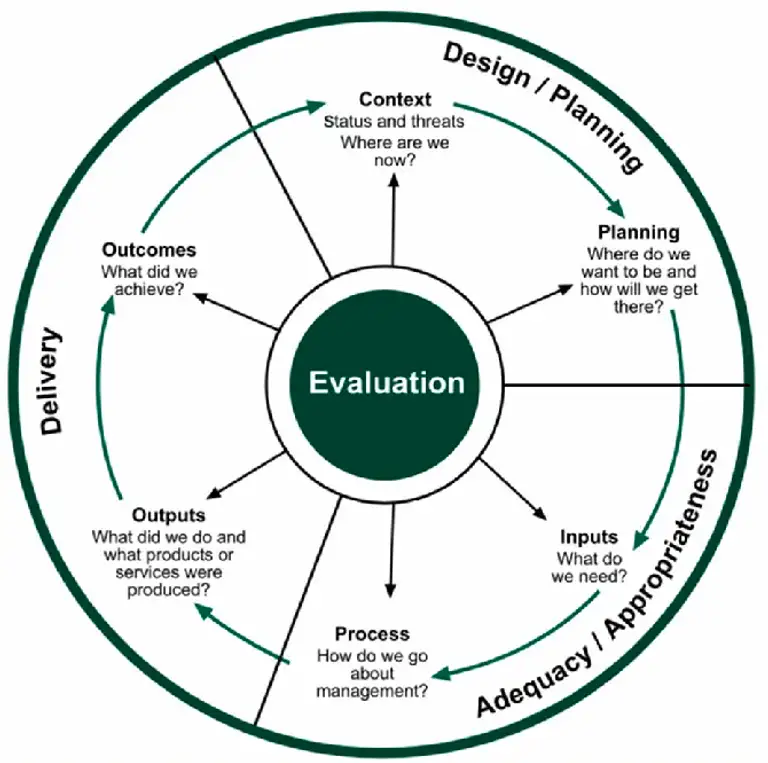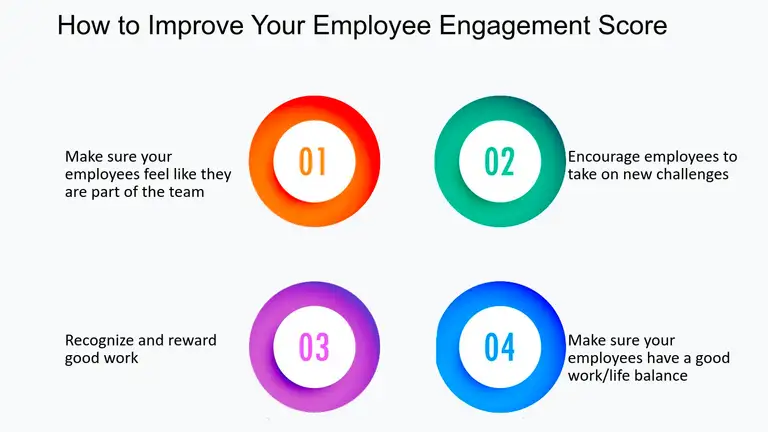Evaluation of management is crucial to the success of any organization. Companies spend a lot of time training good managers and ensuring they understand management theories. This is a good investment because great managers make a massive difference when it comes to the effectiveness of employees and general business performance.
That’s great, but how do you know that the money spent training and developing good managers is being put to good use? And how can you properly evaluate your managers?
Well, evaluation of management generally depends on your goals, but here are some ways to evaluate your managers. You'll find out how the evaluation process works and why ongoing evaluation is key to running a tight ship.
Key Takeaways
- Evaluate managers by reviewing the performance of their teams, as it reflects directly on their leadership effectiveness.
- Use anonymous surveys to collect honest feedback about managers from their teams, providing insights into their management style and effectiveness.
- Measure employee engagement levels through surveys to gauge how well managers motivate and support their team members.
- Monitor turnover rates within teams to assess if management practices are contributing to employee retention or causing departures.
- Check if team members under specific managers are being promoted or developing career-wise, indicating effective leadership.
Evaluation of management by assessing the performance of teams
One of the best ways to evaluate your management is to check their results. To measure how effective a manager is, you can check the performance of the team they lead. In business, performance matters big time.

For instance, if a manager is leading a marketing team, you can check the number and quality of their team’s leads. On the other hand, if they are in charge of a sales team, you can assess their team’s overall contribution. In most instances, most companies already judge their managers using these metrics.
However, when evaluating managers, you shouldn’t look at performance alone. This can lead to burnout, especially if the managers are aware. The teams might end up sacrificing long-term success for short-term wins.
In the end, it may be a medical decision if the managers work so hard to the point of burnout.
Employee surveys and evaluation of management
Employee surveys are another great tool when evaluating management. You just need to make sure you have a good evaluation sample for it to be a credible evaluation.
You should survey your employees several times a year. It is advisable to ensure that these surveys are anonymous, so everyone who participates in the evaluation process will feel empowered to deliver their honest assessment of the management. Not conducting surveys is a mistake. Real issues might be festering in your rank, and you will never know until you ask the right questions.
By conducting surveys with a good evaluation sample, you can get information about how effective your management team is. You will also be able to assess whether the managers are implementing what you taught them.
For instance, if you have been training managers on transparency, you will find out from the team whether they believe the manager is transparent with them. Surveys also allow you to see if your management is improving in specific areas over time.
To make sure your employees realize the value of this type of evaluation, show them the results of the survey. This makes them feel like the staff time is valued, that the results matter and this is a credible evaluation that makes an impact.
Also, make sure to have a solid evaluation budget set up if you plan to run an evaluation review regularly.
Engagement score
Your company’s management is the key link between your organization and its employees. Managers are not the only factor that affects employee engagement. However, they are crucial because of their unique opportunity to assess and influence employee engagement at an individual level.

You can run engagement surveys with a specific series of questions that measure how employees view their managers. If you understand how to interpret this score, you can gain a clearer view of the effectiveness of your management.
The most common way used to come up with an engagement score is by calculating the average scores for a series of survey items linked to the management relationship. If the engagement score for one manager is particularly lower than similar teams in the organization, this is a sign that the manager is falling short.
If you combine the data from engagement surveys with high performer turnover or absence rates, you will get a good idea of how the manager’s performance is impacting the entire team. For instance, a low engagement score, coupled with high resignation rates, means that the manager needs to improve.
The team’s turnover rate
The only issue with this performance evaluation metric is that it’s reactive. Great management builds teams of engaged workers who have no intention of leaving the company. If you start having issues with the employee turnover rate, it might be too late to intervene.
However, you must always check your team’s turnover rate. If there are unexplained spikes, you need to do research and find out if there is anything on the management’s side that’s causing people to leave. Sometimes it might be due to factors outside of the management’s control.
In most cases, you must not think about high turnover as being a manager’s problem. Instead, it indicates an overall organizational failure. If people are eager to leave your company, it might not be the manager’s fault. Instead, you must ensure that you give that manager the right tools to be successful. You should also review tools like a leave portal to track employee departures and identify patterns contributing to turnover. Additionally, you must blame it on the manager’s manager for not performing their own employee evaluation and acting sooner.
Are their employees moving up?
A great leadership team produces more good leaders. So, as part of evaluation of management, you need to check whether a manager’s team members are promoted within your organization. However, you need to take an open-minded approach when measuring this metric. It’s true that you want a manager with team members who aren’t leaving your company.
And in an ideal world, each of your manager’s team members who get a promotion must do so within your own organization. That said, if a great manager develops a person until they are ready to handle bigger roles, and those particular roles aren’t available within your organization, chances are the person will most likely move to another organization.
That means turnover might not necessarily be a manager’s fault. Why not? A few reasons. First off, if you are not able to promote everyone within your organization, it’s normal that these people will end up going elsewhere to take up large roles.
This is an indication that you have a strong leadership pipeline. Secondly, if your managers help someone grow and they end up getting a job elsewhere, that person will become an advocate for life.
They will refer others to your company and generally speak positively about you and your management. This is a huge plus when you are trying to acquire the best talent. You might have lost one good employee, but now you have someone telling others how great your organization is.
These are some of the metrics that can be used for the evaluation of management. The importance of evaluation in management can never be overemphasized. This is because the role played by managers in an organization is pivotal to the output of the organization.
As a business, you will heavily depend on the knowledge and commitment of your staff. Therefore, it is essential to ensure that the people closest to your staff bring out the best in their teams. The best way to do this is by having an effective evaluation of the management system.
The evaluation life cycle should start at the top of the food chain and move downwards. You should then take a look at individual contributors and do a process evaluation too.
Do an ongoing evaluation of your team with Unrubble
The most credible evaluation methods are those that are based on hard evidence. With Unrubble, you can track the time for your team to find out their habits, productivity and overall performance. You don't need an evaluation firm - Unrubble is perfect for the ongoing evaluation of your team.
With just a few clicks, track time for your team and external stakeholders. Starting is as easy as signing up in a few clicks.
Grab your free trial and get started today!
Learn More
Need strategies for better leadership? Check out our comprehensive collection of articles and guides on Management and Leadership to find what works best for you.
- Improve your team's effectiveness with our guide on management styles for effective leadership. It’s a comprehensive dive into enhancing leadership skills.
- 60% of organizations report a leadership gap. Close yours with insights on authority vs leadership.
- Boost your skills with these best leadership activities. Perfect for team leaders looking to improve!
- Enhance your team management with our recommended people management books.
- Learn the essentials of selecting the right leaders with our guide on how to choose a manager properly.
FAQ
What is evaluating management?
Evaluating management involves assessing the effectiveness and efficiency of managers within an organization. This typically includes reviewing a manager's performance, leadership skills, decision making, and communication skills through a manager evaluation process.
What are the four types of evaluation in management?
The four types of evaluation in management are formative, summative, process, and outcome evaluations. These focus on different aspects of managers' performance and the impacts of their decisions on teams and projects.
What are the methods of evaluation in management?
Methods of evaluation in management include 360-degree feedback, where input is gathered from direct reports, other managers, and other teams; self-assessment; and objective performance metrics assessed through a structured manager evaluation form.
What is an example of evaluation in management?
An example of evaluation in management is using an evaluation form to assess a senior manager based on leadership skills, effective communication, and feedback from direct reports and peers within the organization.
What is the meaning of evolution of management?
The evolution of management refers to the historical development and changes in theories and practices of managing organizations, highlighting shifts in strategies, structures, and processes to adapt to changing business environments and management philosophies.
How to evaluate management of a company?
To evaluate the management of a company, implement a comprehensive manager evaluation process that includes reviewing managers' performance, analyzing feedback from direct reports and other teams, and assessing key competencies such as decision making and constructive feedback.





